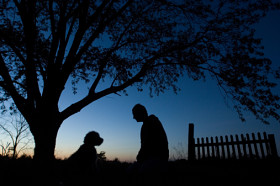The most common options for body care are cremation or burial. In contrast to human cremations, companion animals can not only be cremated 100% alone but also with other animals partitioned by space, bricks or small divider, or in a communal group. 100% Private cremation is just that — one  animal in the cremation unit at a time. Partitioned is a hybrid between Group and Private. Multiple animals are placed within the unit but separated by a small barrier or space. The cremains (or “ashes” ) are returned to the family after 100% Private and Partitioned. Ashes are not returned after Group cremation. They are usually taken to landfill, spread at sea (crematories on the coasts offer this service) or scattered. With Partitioned cremation, there is active co-mingling of the cremains that occurs within the cremation unit so some crematories feel this is an unacceptable practice and don’t offer it. What’s important to know is that because Partitioned is much more economical than 100% Private, many times it is the only option besides Group offered to a family. In some parts of the country, Partitioned accounts for greater than 90% of cremations of those not cremated in group. If 100% Private cremation is desired, it is very important to express those wishes. Chicagoland is blessed to have several crematories that only offer 100% Private cremation and Group. Examples of such crematories are Hinsdale Animal Cemetery, Chicagoland Pet Cremation, Moss Family Paws and Kozy Acres Pet Cemetery and Crematory.
animal in the cremation unit at a time. Partitioned is a hybrid between Group and Private. Multiple animals are placed within the unit but separated by a small barrier or space. The cremains (or “ashes” ) are returned to the family after 100% Private and Partitioned. Ashes are not returned after Group cremation. They are usually taken to landfill, spread at sea (crematories on the coasts offer this service) or scattered. With Partitioned cremation, there is active co-mingling of the cremains that occurs within the cremation unit so some crematories feel this is an unacceptable practice and don’t offer it. What’s important to know is that because Partitioned is much more economical than 100% Private, many times it is the only option besides Group offered to a family. In some parts of the country, Partitioned accounts for greater than 90% of cremations of those not cremated in group. If 100% Private cremation is desired, it is very important to express those wishes. Chicagoland is blessed to have several crematories that only offer 100% Private cremation and Group. Examples of such crematories are Hinsdale Animal Cemetery, Chicagoland Pet Cremation, Moss Family Paws and Kozy Acres Pet Cemetery and Crematory.
To make it even more confusing, the terminology labeling the different cremation options is varied and inconsistent. Be aware that Private and Individual cremation are both used to refer to 100% Private or Partitioned. This inconsistency creates a lot of confusion.
There is a lot of fear out there about what exactly is going to happen with our companions during their cremation process. As there should be. Check out Freakonomics’ Podcast “The Troubled Cremation of Stevie the Cat”. Sadly, there are many crematories where the line between being a dignified pet memorial service and waste disposal company is blurred. Important core questions to ask to ensure your pet will be treated with dignity and care are:
Can 100% Private cremations be witnessed? Is there an open door policy for the public?
What happens to the cremains of pets cremated communally?
If the cremated remains of those cremated communally are scattered, can those areas be visited?
Can cremains be returned within a time frame to accommodate my wishes?
What tracking system is used to guarantee animals are identifiable throughout the process of Private (or Partitioned) cremation?
Everyone can ask these questions of their crematory! Using the crematory your vet uses? Find out who they use and call them. Your inquiries should be met with compassion, patience and thorough explanations. Anything short of that is a red flag.
The veterinarians we partner with have toured and interviewed each of their crematory partners. Surprisingly (& sadly), this visit and interview process is pretty rare amongst veterinarians. For many, it just comes down to who offers the cheapest cremation. For us, it’s about who offers the most compassionate, respectful body care services. We do this research so that families don’t have to, if it makes them uncomfortable. On the other end of the spectrum, because we work with crematories that have open door policies, families can stay with their companions through the entire process, if they desire.
Burial is another beautiful way to memorialize our pets. It can be done at a pet cemetery or on private property. Check with local county laws governing private burial. If considering private burial, state law does require calling JULIE (1-800-892-0123) prior to any digging project. To prevent the attraction of wild animals, placement should be at least 3-4 feet below the ground’s surface, wrapped in plastic and placed in a pet casket/wood or metal box. Placing large stones or a heavy object over top the grave is another deterrent for curious wild animals.
The delicate subject of the latter days of our pet’s life cycle is never an easy one to tackle. Usually filled with questions, heartbreak and stress, families can find comfort knowing that there are respectful and dignified options out there to help create an experience that our companions deserve. They do so much for us. It’s the least we can do for them in their most tender years.

